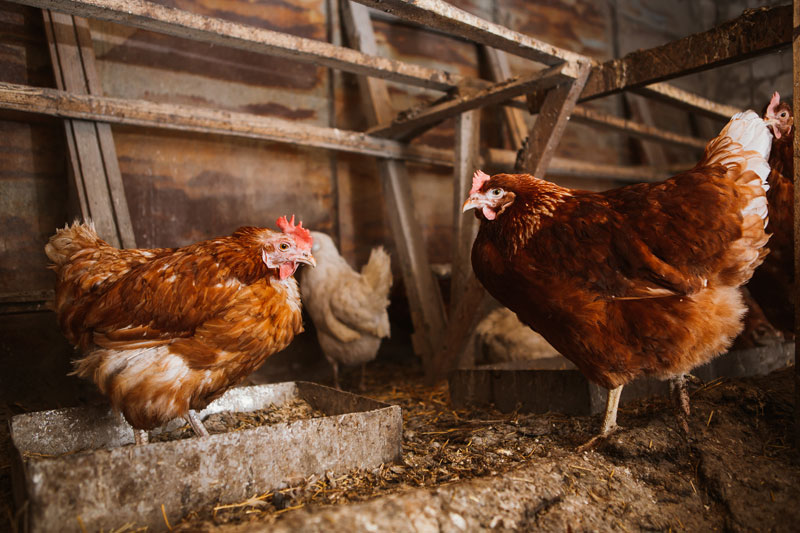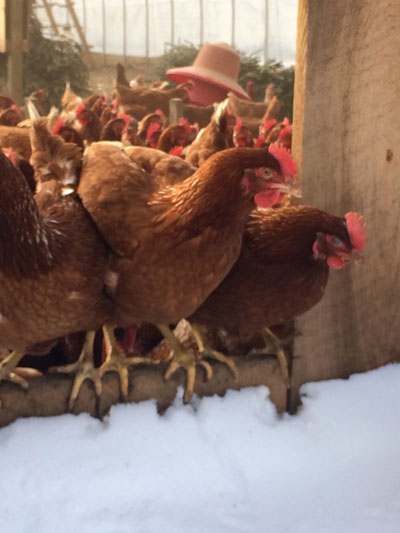Fowl Play: How to Engage Chickens When They Have to be Cooped Up
Keeping chickens engaged helps avoid naughty behavior.
Fowl Play: How to Engage Chickens When They Have to be Cooped Up
Keeping chickens engaged helps avoid naughty behavior.

Specifically, these lady birds are Rhode Island Reds, a fairly common breed of laying hen, and number around three hundred. They live in a hoop house constructed of wood and heavy plastic which covers around 3,000 square feet and includes such accommodations as straw-lined nesting boxes and natural wood roosts. The sides of the hoop house roll up to allow ventilation and extra sunlight, and during most days trap doors are opened to allow the hens free range of the surrounding fields and woods. They should, by any standards, be very happy chickens.
The primary issue at hand arose in mid-January, during a cold spell that prevented the chickens from their usual outdoor wandering. Instead of poking the ground in search of worms, bugs, and other such delicacies, the birds turned to antagonizing one another. Like bored siblings on a road trip, they pecked at one another – generally harmless behavior, until it got out of hand. Chickens tend to emulate the actions of other birds in their flock, from venturing out into alien, snowy fields to attacking the contents of a cracked egg. The sight of blood on their companions, not uncommon in younger birds as they begin to lay, provokes a flock-wide frenzy that can quickly change a situation from merely uncomfortable to deadly for the bird.
This frenzy of antagonization, known as cannibalism, consists of many birds pecking incessantly at the vent (or cloaca) of the injured bird and can result in permanent reproductive damage and death. Different from the establishment of the pecking order, this process tends to target injured individuals with blood as the primary source of provocation. If noticed early, the injured bird can be removed, cleaned, and returned to the hoop house or coop after recovering enough to escape notice by her peers. However, if such cannibalization is left unchecked in a population of chickens, it can prove highly detrimental to the flock. And so began my attempt to occupy the chickens’ time. To start, I consulted a professor at the University of Connecticut Agricultural Extension. Here’s how the farm’s lead farmer and I applied the advice we received.

1) Provide an Interesting Environment
While unable to allow the lady birds to roam the fields, the primary solution to their pecking problem was to provide sources for scavenging in the hoop houses. Their homes already had a healthy supply of leaf litter on the ground, which was collected and dried in autumn. Leaf litter provides a blanket of insulation, prevents odor in the hoop house, and provides a venue for dust baths – entertainment for both humans and fowl. Most importantly, leaves provide a field for foraging when weather prevented outdoor activity. Similarly, adding other natural distractions helped maintain a stimulating environment. The farm was able to obtain several discarded Christmas trees, which improved the smell of the hoop houses and provided protective hiding spots for injured birds. Perches, with abundant space for the whole flock, also allow for refuge for injured individuals.
2) Keep Them Fed
Maintaining constant food and water sources for the flock helped alleviate agitation, hunger, and boredom. The laying hens were fed both morning and night – a grain mixture and a small supplement of cracked corn respectively – with some residual grains in the leaf litter providing fodder for foragers. Chickens also enjoy food scraps. This flock particularly found pleasure in potato peelings and leafy greens which, when given, they would use for a flock-wide game of chicken chase. The momentary victor would grip the prize in their beak while a hoard of hens followed quickly at its heels. The ensuing melee resembling, once again, siblings engaged in a petty, playful tussle.
More delicate leafy greens such as a kale and collards provided momentary excitement, but for extended entertainment, cabbage proved the most beneficial. Sliced into quarters for easily accessible leaves, whole heads were hung from the ceiling of the hoop house to provide a more constant source of scraps.

3) Monitor the Flock
Providing entertainment certainly helps prevent boredom in chickens, as it does humans, but persistent vigilance most effectively prevents the ultimate outcomes of cannibalism when it really becomes a problem. Removing injured individuals immediately reduces the flock’s reaction, hopefully before they inflict permanent damage. Awareness of activity in the hoop house or coop also permits the observation and removal of particularly antagonistic individuals, who incite the large-scale attacks. Checking the chickens regularly reduces bad behavior and provides an opportunity to monitor food and water supply.
Although these suggestions proved largely successful at the small farm where I work, my own experiences are fairly limited. These suggestions are merely meant to point your flock in the right direction if winter humdrums and subsequent cannibalism begin to occur. Depending on environmental stressors and the chickens themselves, flocks react differently to stimuli and these suggestions may require tweaking to suit the birds and encourage fowl play. Always feel free to contact your local extension office for more specific advice.
Follow us
This work is licensed under a Creative Commons Attribution-NoDerivatives 4.0 International License.
Want to republish a Modern Farmer story?
We are happy for Modern Farmer stories to be shared, and encourage you to republish our articles for your audience. When doing so, we ask that you follow these guidelines:
Please credit us and our writers
For the author byline, please use “Author Name, Modern Farmer.” At the top of our stories, if on the web, please include this text and link: “This story was originally published by Modern Farmer.”
Please make sure to include a link back to either our home page or the article URL.
At the bottom of the story, please include the following text:
“Modern Farmer is a nonprofit initiative dedicated to raising awareness and catalyzing action at the intersection of food, agriculture, and society. Read more at <link>Modern Farmer</link>.”
Use our widget
We’d like to be able to track our stories, so we ask that if you republish our content, you do so using our widget (located on the left hand side of the article). The HTML code has a built-in tracker that tells us the data and domain where the story was published, as well as view counts.
Check the image requirements
It’s your responsibility to confirm you're licensed to republish images in our articles. Some images, such as those from commercial providers, don't allow their images to be republished without permission or payment. Copyright terms are generally listed in the image caption and attribution. You are welcome to omit our images or substitute with your own. Charts and interactive graphics follow the same rules.
Don’t change too much. Or, ask us first.
Articles must be republished in their entirety. It’s okay to change references to time (“today” to “yesterday”) or location (“Iowa City, IA” to “here”). But please keep everything else the same.
If you feel strongly that a more material edit needs to be made, get in touch with us at [email protected]. We’re happy to discuss it with the original author, but we must have prior approval for changes before publication.
Special cases
Extracts. You may run the first few lines or paragraphs of the article and then say: “Read the full article at Modern Farmer” with a link back to the original article.
Quotes. You may quote authors provided you include a link back to the article URL.
Translations. These require writer approval. To inquire about translation of a Modern Farmer article, contact us at [email protected]
Signed consent / copyright release forms. These are not required, provided you are following these guidelines.
Print. Articles can be republished in print under these same rules, with the exception that you do not need to include the links.
Tag us
When sharing the story on social media, please tag us using the following: - Twitter (@ModFarm) - Facebook (@ModernFarmerMedia) - Instagram (@modfarm)
Use our content respectfully
Modern Farmer is a nonprofit and as such we share our content for free and in good faith in order to reach new audiences. Respectfully,
No selling ads against our stories. It’s okay to put our stories on pages with ads.
Don’t republish our material wholesale, or automatically; you need to select stories to be republished individually.
You have no rights to sell, license, syndicate, or otherwise represent yourself as the authorized owner of our material to any third parties. This means that you cannot actively publish or submit our work for syndication to third party platforms or apps like Apple News or Google News. We understand that publishers cannot fully control when certain third parties automatically summarize or crawl content from publishers’ own sites.
Keep in touch
We want to hear from you if you love Modern Farmer content, have a collaboration idea, or anything else to share. As a nonprofit outlet, we work in service of our community and are always open to comments, feedback, and ideas. Contact us at [email protected].by Flannery Pearson-Clarke, Modern Farmer
March 18, 2016
Modern Farmer Weekly
Solutions Hub
Innovations, ideas and inspiration. Actionable solutions for a resilient food system.
ExploreExplore other topics
Share With Us
We want to hear from Modern Farmer readers who have thoughtful commentary, actionable solutions, or helpful ideas to share.
SubmitNecessary cookies are absolutely essential for the website to function properly. This category only includes cookies that ensures basic functionalities and security features of the website. These cookies do not store any personal information.
Any cookies that may not be particularly necessary for the website to function and are used specifically to collect user personal data via analytics, ads, other embedded contents are termed as non-necessary cookies.